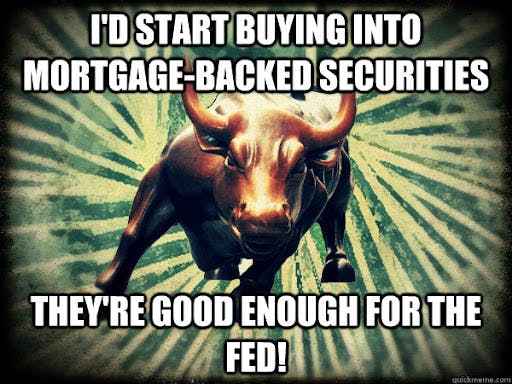
MBS & BS
The Federal Reserve Balance Sheet
Balance Sheet
The best thing about a democracy is the semblance of honesty in society. These government agencies publish public reports about their whereabouts and we have no choice but to believe them - except any entities that are defense related.
Jerome Powell & Friends make it a mission to keep us informed on their balance sheet and I decided to do some snooping this week only to find that Mortgage Backed Securities were not being sold at a rate I felt was necessary to reduce the size of the balance sheet.
I then came to wonder why they might have a bias for these assets over US Bonds?
MBS
What are MBS's? This is a great question but it is basically a bundle of mortgages. Banks hold mortgages as an asset with fixed or guaranteed income. But there is a risk that some 1 - 5% could become delinquent. By bundling many of them and then valuing this new asset at a 5 - 10% discount, you have an MBS!
Mortgage Backed Securities explained... further
800 Mortgages with debtors who have an extremely poor chance of delinquency.
150 Mortgages with debtors who have a moderate chance of delinquency.
50 Mortgages with debtors who have a great chance of delinquency.
1000 Mortgages bundles have a claim on future income from 1000 debtors. The value of a 300,000 Dollar mortgage at 6% is 786,000 USD or 26,220 in annual income over 30 years. Bundling 1,000 of these allows banks to sell these future incomes in the present.
These things ensure that mortgages have an owner and ensures that someone is willing to hold the risk of a mortgage. Without a holder, we the price of a mortgage likely goes up and the cost of houses likely goes down. The Federal Reserve is seemingly backstopping the market by assuming the risk which encourages more risks in the long run from private players in the market.
Why might they backstop? Mortgages are the biggest business of banking. The concept of modern banking in America is to get people inside of houses using consumer deposits. Mortgages are the largest asset class in the country, barring safer cash options like bonds and certificate deposits. If Mortgage Backed Securities, to the tune of 2,400,000,000,000 USD were to hit the market the risks would have to go somewhere in the private market. Banks would like fall into a panic.

Why? The ability to create mortgages is apart of banks ability to create money. For them to hold these assets, there is a strong likelihood that they wouldn't want to lend out further unless it was on really cozy terms. Hence, the price of a mortgages (interest) would go up. The majority of the public would not be able to afford these higher rates, and newer buys would slow. Demand for homeownership would drop, and this would reduce the price of existing homes on the market, thereby reducing household wealth.
Where does the buck stop?
This is my only question. When is it wise to unload 2,400,000,000,000 USD of Mortgage Backed Securities onto a market? Dropping it at market top would cause the market to collapse. Dropping it at market bottom would create a lower bottom. This, unlike the eternally liquid US Bond Market, would likely result in a market panic.

I think it does not stop. Literally ever. The Federal Reserve has never shown an appetite to sell these assets in a clean and concerted effort like they have the bonds. The Expiry on these assets is likely some 30 years in the future, and a recession (or depression) would likely harass the debtors' ability to pay further depressing the value of these assets.
In truth, I think everyone at the Federal Reserve knows there is no way out. MBS can only be bought in huge supply, but never sold.

